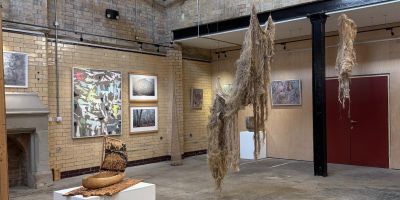Stories from Holocaust prisoners forced to work in the gas chambers should be heard, not silenced
Stories from Holocaust prisoners forced to work in the gas chambers should be heard, not silenced
Dr Dominic Williams (Montague Burton Fellow in Jewish Studies, School of Fine Art, History of Art and Cultural Studies) has had an article published in The Conversation on the Auschwitz Sonderkommando, the group of slave labourers in the camp crematoria, whose own written testimony has mostly been ignored or overlooked.
Williams says in the article:
“On October 7 1944, a group of prisoners in Auschwitz-Birkenau took up tools and stones and attacked their SS guards. Some attempted to flee, others ran into a nearby building and set it on fire. Another section of their group stationed some half mile away killed a kapo, or prisoner-overseer, broke out of their building, cut the wire fence and escaped into the countryside. Before they had covered more than a few miles, they were tracked down and killed.
“This revolt was the largest and most determined uprising that happened in Auschwitz-Birkenau. But it met with little success. It certainly did not save the lives of those who took part in it: about 450 members of their work group were killed in the uprising or in retaliation for it. Nor does it seem to have had much effect on Birkenau’s killing capacity.
“But this probably does not account for the relative obscurity of the revolt. Instead, the status of those who were involved in it often causes people to hesitate before discussing them. This work group, or ‘special squad’, is more often known by its German name, Sonderkommando. They were slave labourers, almost entirely drawn from Jewish arrivals to Auschwitz, who were forced to process and dispose of the bodies of those murdered in the gas chambers. They were marked for death in their turn. Indeed, their revolt was a response to the imminent threat of being deported and murdered.”
The article goes on to discuss how films and books have approached the memory of the Sonderkommando, tracing the different ways that they have been represented from the 1950s to the present day. It shows that the prisoners’ own testimony, which they managed to write within the camp before they were murdered, is still being neglected in favour of myths and simplifying narratives.
The full article, featured in the Arts and Culture section of The Conversation on 6 October 2016, can be read here.
Dominic Williams is the Montague Burton Fellow in Jewish Studies at the University of Leeds. He is the co-author (with Nicholas Chare) of Matters of Testimony: Interpreting the Scrolls of Auschwitz (Berghahn), which will be published in paperback in November.
The main focus of his current research is on representations of the Auschwitz Sonderkommando, ranging from the framing of their testimony in post-war trials to novels and films in which they appear as characters to their presence in sub-cultural forms such as comics and extreme metal music. He also researches Holocaust testimony and memorialisation more widely; contemporary Jewish poetry; Anglo-American modernism and antisemitism; and twentieth-century British Jewish literature and culture.




